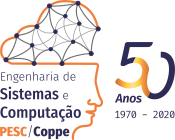Calendário de Eventos
|
Estaremos recebendo novamente a visita do prof. Bruno Ribeiro, da Universidade de Purdue, EUA. O tema de sua palestra está bem no centro do atual furacão que revolve Machine Learning, Data Science e Network Science, e será acessível a um público não especializado. Além da palestra, o Bruno estará disponível para conversar com professores e alunos interessados em trocar ideias e iniciar possíveis colaborações.
Programe-se, participe e ajude na divulgação! Mais detalhes abaixo.
---
Palestrante:
Bruno Ribeiro, Assistant Professor, Purdue University, EUA
Dia/horário/local:
Terça, 11 de outubro, 11h, sala H-324B
Title:
Embracing Complex Data in Machine Learning without Black Boxes
Abstract:
Recent rapid advances in machine learning point to a new trend: embracing complexity. From neural networks embracing complex models, to new ways of learning from structured data, to the learning of complex time-varying sequences.
In my talk, I argue that embracing the complexity in the data and creating interpretable, insightful models are principles that need not be at odds. I will show how to improve state-of-the-art link, label, and activity predictions in complex networks by embracing the complexity of its structure while obtaining a model that is interpretable and offers new insights into people's relationships. I will also show we can model web users as complex transient time-varying and somewhat-unpredictable entities and still get a model that is interpretable and can forecast their actions. Finally, to embrace complex models we also need to speed-up complex inference procedures. To this end, I will present a novel method that performs fast perfect sampling in Markov Chain Monte Carlo methods (fast sampling without bias), and explain how this gets us closer to eliminating what is arguably the Achilles heel of learning complex models without resorting to approximations.
Short Bio:
Bruno Ribeiro is an Assistant Professor at the Department of Computer Science at Purdue University. He obtained his Ph.D. at University of Massachusetts Amherst and did his postdoctoral studies at Carnegie Mellon University. His research interests are in the areas of machine learning, data mining, data science, and modeling complex systems.








